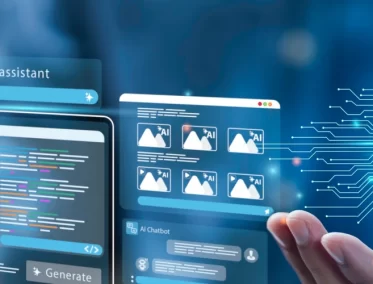In regulated industries such as banking, healthcare, insurance, and manufacturing, quality assurance (QA) is not just a technical requirement — it’s a regulatory necessity. With stringent compliance standards like HIPAA, SOX, PCI DSS, and FDA regulations, ensuring software quality is directly tied to operational continuity, data privacy, and business reputation. The traditional approach to software testing, even with conventional automation tools, has proven insufficient in meeting the speed, accuracy, and adaptability required in today’s hyper-digital world. This is where Gen AI Test Automation emerges as a transformative force.
What is Gen AI Test Automation?
Gen AI Test Automation leverages generative AI and machine learning to enhance traditional automation frameworks. Unlike conventional scripted test automation that relies on predefined test cases and conditions, Gen AI uses natural language processing (NLP), predictive analytics, and deep learning to autonomously generate, execute, and maintain test scenarios based on real-time data, business logic, and evolving application behavior.
By integrating AI models trained on vast amounts of historical test data, transaction logs, and production issues, Gen AI Test Automation enables proactive, intelligent testing that can predict defects, auto-correct scripts, and optimize regression suites — reducing both risk and manual effort.
Why Test Automation Needs a Gen AI Boost in Regulated Industries
High Stakes for Compliance and Security
Regulated industries handle highly sensitive financial, health, and personal data. Testing must not only validate functionality but also compliance with regulatory frameworks. Gen AI Test Automation can analyze compliance checklists, test data privacy workflows, and validate security policies autonomously, reducing the chances of non-compliance.
Complex and Evolving Systems
Banking systems, insurance underwriting platforms, and pharmaceutical databases are highly complex and undergo frequent changes due to regulatory updates or business evolution. Conventional test scripts struggle to keep pace, while Gen AI Test Automation can dynamically adapt test scripts to accommodate changes in APIs, UI elements, and logic without manual rework.
Continuous Delivery Requirements
Regulated enterprises are under pressure to deliver new features faster while ensuring zero downtime and operational safety. AI-powered test orchestration and Gen AI Test Automation integrate seamlessly into CI/CD pipelines, enabling faster deployments with confidence.
Benefits of Gen AI Test Automation
- Self-Healing Test Scripts
Gen AI Test Automation systems monitor applications during test execution and autonomously repair scripts when elements or conditions change, eliminating downtime caused by broken tests.
- Risk-Based Testing Prioritization
By analyzing historical defect patterns, transaction logs, and audit trails, Gen AI models prioritize high-risk test cases, ensuring critical business processes are validated first.
- Predictive Defect Analytics
Gen AI Test Automation predicts potential failure points in applications before they occur, based on trends and anomaly detection in past test cycles, reducing defect leakage to production.
- Natural Language Test Authoring
Using natural language processing (NLP), Gen AI Test Automation tools enable testers to write test cases in plain English. AI models then convert them into executable test scripts, minimizing the skill barrier.
- Enhanced Regulatory Reporting
In regulated industries, audit trails of test activities are mandatory. Gen AI Test Automation tools automatically generate comprehensive test logs, compliance evidence, and impact analysis reports aligned with regulatory guidelines.
Key Use Cases in Regulated Sectors
As Gen AI Test Automation continues to mature, its real-world applications in regulated industries are becoming increasingly significant. Sectors like Financial Services, Healthcare, Insurance, and Manufacturing operate under stringent compliance requirements and high operational risk. Here’s an in-depth look at how Gen AI Test Automation is transforming these sectors:
- Financial Services
- Automated KYC/AML validation workflows: Gen AI Test Automation accelerates the validation of Know Your Customer (KYC) and Anti-Money Laundering (AML) processes by automatically generating and executing test scenarios for identity verification, risk assessments, and transaction monitoring. AI models predict potential compliance breaches, reducing manual review efforts and improving accuracy.
- Predictive fraud detection and compliance testing: AI-powered anomaly detection models, trained on historical transaction data, proactively flag suspicious patterns and high-risk transactions. Automated test cycles ensure that fraud detection algorithms and compliance controls remain effective under evolving regulatory requirements.
- End-to-end loan approval and transaction audit validations: Gen AI Test Automation enables continuous validation of complex, multi-system loan origination and approval workflows. AI-generated test cases cover transaction history, risk scoring, creditworthiness assessments, and audit trail validations, ensuring both operational accuracy and regulatory compliance.
- Healthcare & Life Sciences
- HIPAA compliance checks for data security workflows: Gen AI Test Automation automates the validation of data privacy and security protocols mandated by HIPAA. AI-generated test scenarios evaluate access control mechanisms, encryption standards, and data anonymization workflows, minimizing risk of data breaches.
- Automated validation of Electronic Health Records (EHR) systems: Healthcare systems depend on accurate, secure, and uninterrupted EHR systems. Gen AI generates test scenarios to validate interoperability, data integrity, and user access controls within EHR workflows, ensuring operational continuity and regulatory adherence.
- Predictive analytics for patient outcome applications: AI-powered predictive analytics applications in healthcare are increasingly regulated for accuracy and bias prevention. Gen AI Test Automation continuously validates predictive models for patient outcomes, clinical decision support, and AI-driven diagnostics, reducing clinical and compliance risks.
- Insurance
- Automated policy issuance and claims processing test cycles: Insurance applications demand high-volume, complex transaction validations. Gen AI Test Automation streamlines policy issuance, renewal, and claims processing validations by autonomously generating and executing end-to-end test scenarios across underwriting, payment, and compliance modules.
- Real-time validation of regulatory changes in insurance underwriting systems: Insurance regulations change frequently. Gen AI Test Automation ensures real-time updates of underwriting rule engines and policy conditions, automatically validating new regulatory changes without downtime or manual intervention.
- Manufacturing & Supply Chain
- Quality assurance for safety-critical IoT systems: Manufacturing increasingly relies on IoT-connected machinery and safety-critical systems. Gen AI Test Automation generates predictive test scenarios for quality assurance, ensuring safety, performance, and compliance with industrial regulations.
- Predictive maintenance test scenarios for smart manufacturing: AI-driven predictive maintenance models require constant validation for reliability. Gen AI automates testing of sensor data streams, anomaly detection algorithms, and real-time maintenance alerts, helping manufacturers prevent downtime and meet industry safety standards.
Want to further optimize automation across your enterprise? Our ebook helps you create a roadmap to scaling intelligent automation in evolving business environments.
Overcoming Implementation Challenges
While the promise of Gen AI Test Automation is immense, its adoption does come with hurdles:
- Data Privacy: Test data anonymization is crucial, especially in healthcare and financial services.
- Legacy System Integration: Many regulated enterprises still rely on mainframes or legacy platforms, requiring hybrid automation strategies.
- AI Model Explainability: Regulatory bodies may demand explainable AI models for audit trails — something organizations must factor in.
The Future of Gen AI Test Automation
According to Capgemini’s World Quality Report 2023-24, over 77% of organizations are actively investing in AI-based QA and continuous testing to meet increasing delivery demands. The report also forecasts that Gen AI Test Automation will become the default standard for regulated sectors by 2027, driven by its ability to:
- Autonomously generate test data and test scenarios based on business rules
- Predict operational risks and security vulnerabilities proactively
- Integrate AI-powered defect triaging into DevSecOps pipelines
Rundown!
Gen AI Test Automation is reshaping the software testing landscape in regulated industries by delivering unprecedented agility, accuracy, and compliance assurance. As regulatory mandates tighten and digital transformation accelerates, AI and generative AI-driven testing are no longer optional enhancements but essential business enablers.
For regulated enterprises, adopting Gen AI Test Automation ensures faster, risk-free product releases, reduced compliance violations, and optimized operational performance, setting a new standard for quality assurance in highly governed industries.




